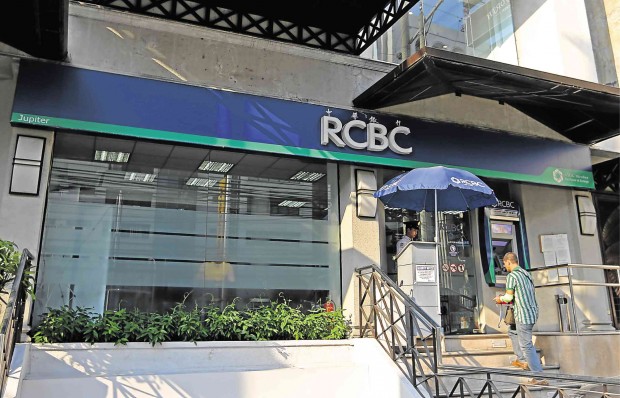
RCBC Jupiter Street branch in Makati where $81 million in laundered money passed through RAFFY LERMA/INQUIRER FILE PHOTO
YUCHENGCO-led Rizal Commercial Banking Corp. has identified two of the faces behind the fictitious bank accounts used to bring to the country $81 million in dirty money stolen by computer hackers from the central bank of Bangladesh.
One of them was identified as a reserve officer of RCBC who was likewise being investigated by the bank for allegedly aiding the RCBC Jupiter branch manager in bringing in the funds, a March 28 report submitted by RCBC to the Anti-Money Laundering Council (AMLC) claimed.
“The BIR ID (TIN No. 755-265-123-000) of Jessie Christopher Magno Lagrosas, bears the picture of Mr. Adrian Ranas Yujuico, reserve officer of RCBC,” RCBC antimoney laundering lawyer Ronald Allan Abarquez said in the report to the AMLC.
“We are also investigating him for active collusion with Ms Maia Deguito (RCBC Jupiter branch manager) as he arranged and organized meetings for Ms Deguito in his house, where witnesses have tagged her as having made offers of money and legal assistance to the personnel of the branch,” Abarquez said.
The same letter said the nonprofessional drivers’ license used to create the account under the name of Michael Francisco Cruz bore the picture of a senior manager from another bank.
It was not clear, however, whether the person whose picture was used to create the Cruz account was aware that his face had been used in this suspicious transaction.
The Lagrosas account received $30 million—the biggest share of the $81 million from Bangladesh on Feb. 5. The money was wired from the US Federal Reserve of New York account of the Bangladesh central bank through correspondent Bank of New York Mellon.
The Cruz account received $6 million on the same day through Wells Fargo New York.
The AMLC earlier charged RCBC branch manager Deguito—along with “John Does” using the aliases in the fictitious accounts—with violation of the antimoney laundering law.
Apart from IDs which RCBC and authorities both determined to be “fictitious,” false addresses were likewise used to create the Lagrosas and Cruz accounts. Based on the documents filed at RCBC Jupiter, Cruz claimed to reside at 261 Banaba St. Forbes Park, Makati City, while Lagrosas’ alleged address was 436 San Joaquin St. San Jose Village, Alabang, Muntinlupa City.
Two other fictitious bank accounts were under the names of Alfred Santos Vergara and Enrico Teodoro Vasquez, whose RCBC Jupiter bank accounts respectively received $20 million and $25 million in suspicious remittance from Bangladesh.
The bank accounts under the names of Lagrosas, Cruz, Vergara and Vasquez were created on May 15, 2015, with initial deposit of $500 each. These accounts remained untouched until the remittance from Bangladesh came.
On the same day that the remittance came from Bangladesh on Feb. 5, “Lagrosas” made an over-the-counter withdrawal amounting to $22 million. On the same day, the same amount was deposited to a newly created US dollar account under the name of businessman William Go, which was the same account used to consolidate proceeds from most of the account. Go has vehemently denied opening this account or any other bank account created in RCBC Jupiter branch and charged Deguito and her deputy, Angela Torres, with alleged falsification of documents.
RCBC, for its part, earlier fired Deguito and Torres for their alleged involvement in the laundering of the stolen $81 million. Other branch and bank officials are expected to be meted out various sanctions ranging from termination to suspension in the coming days when the internal investigation is expected to be completed, the bank has announced.
Based on an earlier report submitted by RCBC head office to AMLC dated March 14, Deguito appeared to have anticipated the big inflow and facilitated its speedy withdrawal with some help within her own branch. Torres was among those accused of assisting Deguito in facilitating the withdrawal of some $58 million on Feb. 9 even after Bangladesh Bank had issued a “stop payment” request.
Only $68,000 of the $81 million money stolen by what is believed to be an international syndicate from Bangladesh had been frozen and returned to the central bank.
By March 1, the suspicious RCBC bank accounts were ordered frozen by the Court of Appeals on the petition filed by AMLC, the agency mandated to enforce the antimoney laundering law in the country. By then, the money that came in on Feb. 5 had found its way to local casinos and other entities.
This money laundering controversy had put the Philippines in a negative light globally and heightened calls to repeal the bank secrecy law and give more teeth to the AMLC to directly freeze and investigate suspicious bank accounts as well as to include casinos among entities covered by reporting obligations under the antimoney laundering law.